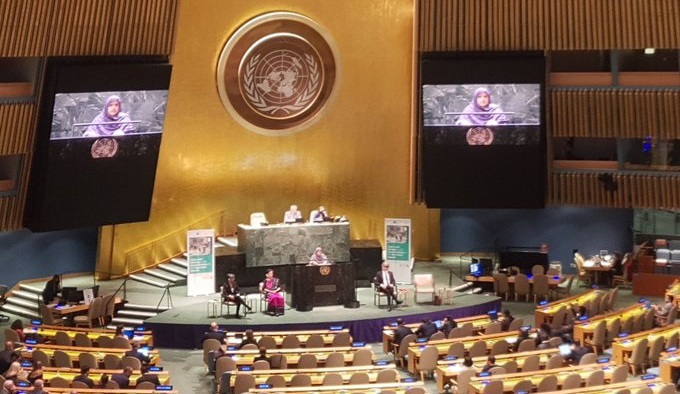The 1976 Human Settlements Conference in Vancouver will probably best be remembered because it was there that the world realized with a shock that in the developing countries a mass migration had started to take place from the rural to the urban areas. The high birth rate in those countries had as a consequence that the fertile land available was not sufficient to provide an adequate income for the newly-born and many of them had to go to the cities in order to find a job. They had to live in slums and low-grade settlements.
The Vancouver Conference not only took note of this ominous development; it also showed, at least in words, that the world community felt a certain responsibility to find a solution for it. At the time of the Conference there were still quite a few “experts”, who believed that the problem could be solved by improving the standard of living in the rural areas, and others who believed that there existed enough technical knowledge to build pleasant cities and that it was just a question of exchanging this knowledge. The main product of the Conference was the Habitat Charter which set standards for government policy in the field of human settlements and announced an international plan of action. (It also recognized for the first time the role of inhabitants and their organizations in the improvement of shelter.)
Today, thirty years and many conferences and resolutions later, we have to recognize that the situation is worse rather than better. Today 30% of the urban population in developing countries lives in slums and it is estimated that between 2005 and 2015 the number of slum dwellers will increase by 300 million. The target of the international community, to improve the living conditions of 100 million slum dwellers by 2020, is grossly inadequate. And today it seems unlikely that even this target will be reached.
The problem of slums is one of several human settlement problems in developing as well as industrialized countries. I give it here special attention because I believe it to be the most serious one. A significant reduction of its proportions would be a major achievement. Which obstacles have stood in the way of obtaining better results so far? There are many.
– The problem is complicated. Land in cities is scarce and expensive; the legal situation of ownership is not always clear; building a house in itself is not sufficient: access and infrastructure, water supply, sanitation, waste removal, medical, educational and social services, protection of the environment, etc. have to be given attention, not to speak of the necessary financial resources.
– Not only are the inhabitants too poor to pay for a house “on the market”; the governments are not exactly rich. Many of them have inherited from colonial times that housing, apart from that for government officials and the military, is not a matter of government concern. National budgets for “social housing” are small or non-existing.
– Assistance in the field of human settlements is low on the list of donor countries, probably because the problem is considered to be too large and too complicated. Other areas, like agriculture and environmental protection, receive considerably larger funds.
– It is now generally recognized that the world-wide problems of inadequate shelter, and indeed of poverty, could be solved if the political will would prevail. Some progress is being made towards that goal, but it is slowed down by the neo-liberal wave which is sweeping over the world and proclaims that market forces will solve all problems.
– The UN is not a world government; it can only operate by consensus. Its activities in the field of human settlements are mainly limited to standard-setting: world-wide discussions on the most desirable policies. In the course of the years different approaches were recommended, known as low-cost housing, sites and services, slum improvements, facilitating. The role of inhabitants and their organizations was gradually recognized; the role of women emphasized. The fact that several UN agencies deal with human settlement matters – UN Habitat, UNDP, the World Bank, the Committee on Sustainable Development, UNEP, the regional Banks – is confusing and a waste of resources. Much more serious is the failure of governments to implement many of the solemn resolutions they adopt in UN meetings.
– Although the adoption of the Millennium Development Goals is a small step forward because it quantifies the objectives of international cooperation, the question “who does what” remains in the air. In fact, the organization of development cooperation by the international community is completely chaotic. Each of the donor governments and the participating international agencies decides not only how much it contributes, but also to which recipient, on which projects and under which conditions. The substantial assistance by NGOs is not better coordinated.
HIC’s position
HIC believes that a better world is possible, based on justice rather than charity. A world in which the human right of housing is universally recognized and put into practice.
HIC is a federation of autonomous organizations. Right from the beginning members differed from each other in the way they choose to achieve HIC’s goal. Sometimes one approach was more dominant in HIC’s policy statements, sometimes another. HIC started as Habitat International Council which mainly consisted of European and North American NGO’s active in the field of development assistance and critically following the UN Committee on Human Settlements. A major change occurred in 1987 when human settlement NGOs, meeting in Limuru, near Nairobi, decided to rename the organization as Habitat International Coalition, reconstituted its structure in order to give more weight to the voices of Africa, Asia and Latin-America and to emphasize its political character.
In the course of the last twenty years the discussions within HIC have shown various shades of opinion. Although fighting for the right to housing remains the predominant goal of the organization, it is, more than before, recognized that codifying this right in a nation’s lawbook, is in itself not sufficient to build one single house. At the same time members are coming to the conclusion that, although inhabitants should, for various reasons, be encouraged and supported to take an active part in the planning, construction and management of their houses and neighbourhoods, it would not be realistic to think that they could achieve their goals without substantial outside assistance. HIC’s program Social Production of Habitat demonstrates this insight.
HIC’s policy towards the UN and its involvement in UN activities is another example of changing moods. In view of the frustrating decision-making processes and the disappointing results of the world organization the absence of enthusiasm is not always surprising. Personally, I believe that the attitude of HIC towards the UN should be positive, trying to improve the organization rather than to neglect it. With all its imperfections, the UN is the most concrete realization of a world order based on the rule of law and international solidarity. In view of the present threats of hegemony, strengthening the UN is more than ever needed.
The UN is at the origin of international agreements on human rights, including the right to housing. We have to support its effort to implement that right. The dimensions of the human settlement problems of the world are such that only a massive international effort can solve them.
This is a discussion paper and as part of that discussion I am adding a few minor suggestions to give concrete form to my point of view.
HIC might:
_ Press for a more ambitious MDG for slum improvement.
_ Work for the inclusion of a standard clause in development assistance agreements providing for the participation of inhabitants in the planning, execution and management of human settlements projects and, in order to minimize corruption as much as possible, in the supervision of its finances.
_ Submit a proposal to the ministers of housing of the European Union to coordinate and systematize their countries’ development assistance in the field of human settlements.
_ Widen the publicity it gives to illegal forced evictions.
_ Make a study and draw conclusions of successful housing programs of citizens organisations, as well as of local and national governments.
Finally, I believe that HIC is on the right track. Its task is not yet finished!
Han van Putten,
26 May 2006
–


